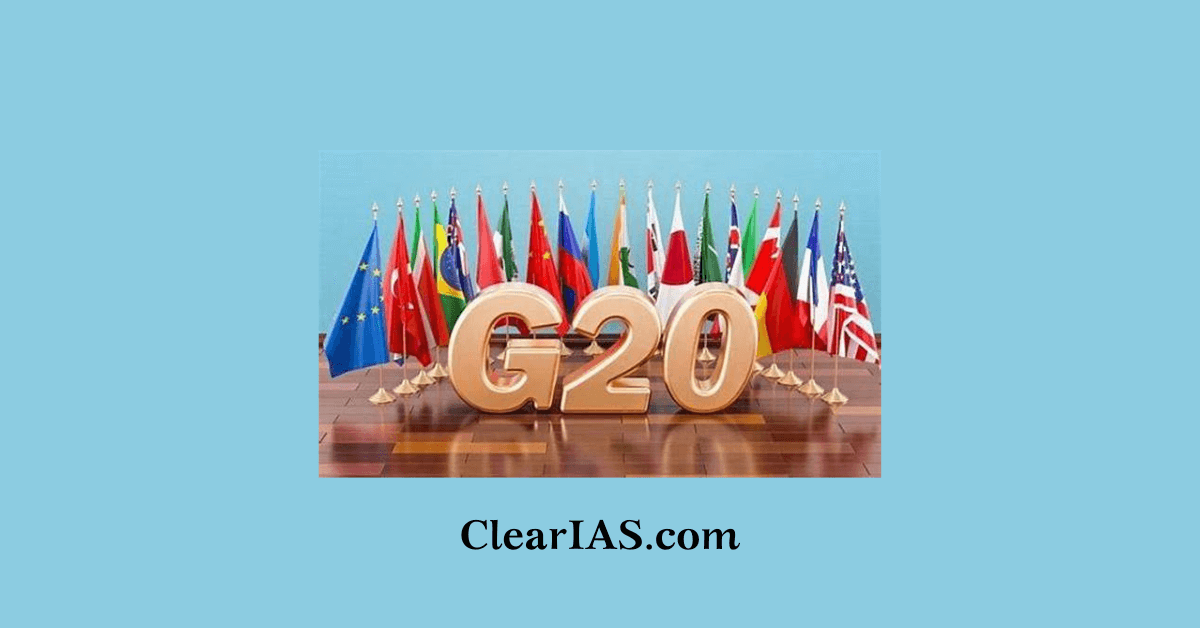
The leaders of the world’s most sophisticated economies, known as the G-20, have arrived in Bali’s Nusa Dua resort for the 17th G20 summit, which will be presided over by Indonesia and held on November 15-16, 2022.
While the Summit’s main focus will be on post-pandemic recovery and dealing with energy and food security issues touched by Russia’s war in Ukraine, the bilateral meetings on the sidelines will be of great interest.
Indonesia handed over the G20 chair to India for the coming year as the grouping’s Bali summit concluded with the member countries finalising the unified declaration.
Agenda of the 2022 Summit
The 2022 G20 Bali summit is the seventeenth meeting of the Group of Twenty (G20), and it is slated to take place on November 15-16, 2022, in Nusa Dua, Bali, Indonesia.
The G20 chairmanship of Indonesia began on December 1, 2021, with the summit taking place in the fourth quarter of 2022.
- This G-20’s motto is Recover Together, Recover Stronger. Despite geopolitical concerns overshadowing the gathering, President Joko Widodo has made recovery from the pandemic a top priority.
- The leaders will meet in three sessions to discuss food and energy security, the Health Partnership for Global Infrastructure and Investment, and digital transformation.
- Mr Joko Widodo will also accompany his guests to the Indonesian mangroves of Taman Hutan Raya, which have been rebuilt over a 30-year endeavour encompassing around 700 acres, to highlight climate change challenges.
- Mr Modi, Prime Minister of India, will explain his aims for the coming year as India holds the G-20 presidency, with a focus on the Global South and the issues it is experiencing as a result of geopolitical turmoil, food, and fuel shortages.
Bali Declaration
The G20 Bali Declaration was a joint statement issued at the conclusion of the summit that summarised the member countries’ promises to the globe and strategies to overcome the issues at hand. The proclamation, which marked the end of Indonesia’s year-long G20 presidency, focused on financial stability, humanitarian crises, poverty, and aid to least-developed countries, among other issues of concern to the group.
According to the declaration, one member had “diverse perspectives” on the topic of paragraph 33, which discussed debt difficulties. Nevertheless, there was no mention of any differing viewpoints in paragraphs 3 and 4, which discuss the Ukraine crisis and currently appear to be impeding a consensus amongst the partner countries, particularly the West and Russia-China.
Bali Declaration mainly consists of war in Ukraine and Security risks.
War in Ukraine
- According to the declaration, the war in Ukraine is producing economic hardships and insecurity around the world.
- It also labelled the prospect of employing nuclear weapons in the war as “inadmissible”.
- The majority of members strongly condemned the war in Ukraine, emphasising that it is causing immense human suffering and exacerbating existing global economic fragilities – “constraining growth, increasing inflation, disrupting supply chains, heightening energy and food security risks, and elevating financial stability risks,” according to the declaration.
Security risks include
- In addition, the G20 declaration urged the international community to “intensify” efforts to combat money laundering, terrorism financing, and proliferation finance.
- In addition, the proclamation asked the Financial Action Task Force (FATF) and FATF Style Regional Bodies to “lead global action” in response.
Background to the declaration
After a rocket from the Ukrainian battlefield fell in Przewodow, eastern Poland, close to the Polish border with Ukraine, US President Joe Biden convened an emergency summit of the Western alliance in Bali.NATO nations convened an emergency summit to identify who fired the missile.
Ukraine War and Bali declaration
Russia and China were opposed to the G20 finance and foreign ministers condemning Russia’s invasion of Ukraine and the fact that the war created significant ups and downs in numerous sectors, impacting the global economy. Because neither country agreed to include these items, the G20 leaders failed to issue a joint communique both times.
- The Ukraine crisis is expressly blamed in paragraph 3 for existing global economic fragilities such as rising inflation, disruptions in supply and chain, and increased food and energy instability.
- According to the report, most countries denounced the war and demanded Russia’s “full and unconditional” withdrawal from Ukrainian land.
- “Most members strongly condemned the war in Ukraine, emphasising that it is causing immense human suffering and exacerbating existing global economic fragilities – constraining growth, increasing inflation, disrupting supply chains, heightening energy and food insecurity, and elevating financial stability risks,” it added.
- There were opposing viewpoints and appraisals of the issue and punishments.”
- The proclamation said that G20 is the stage to discuss security concerns, but stressed that security challenges can have “major ramifications for the global economy”.
- “Although we recognise that the G20 is not the platform for resolving security challenges, we realise that security issues can have substantial implications for the global economy,” it stated.
- Meanwhile, paragraph 4 of the Bali Declaration focused on the humanitarian aspect, the use of armaments, and conflict resolution methods.
- It requested that the United Nations Charter Principles and international humanitarian law be defended. The use of nuclear weapons was categorically condemned in the declaration.
- “It is critical to defending international law and the multilateral framework that protects peace and stability.
- This includes defending all of the United Nations Charter’s purposes and principles, as well as adhering to international humanitarian law, particularly the protection of populations and infrastructure in armed situations.
- The use or threat of using nuclear weapons is prohibited,” the text stated.
- “The peaceful resolution of conflicts, attempts to address crises, as well as diplomacy and conversation, are critical,” it added, focusing on nonviolent means to resolve the ongoing conflict.
- Today’s era cannot be one of war.”Russia and China were both opposed to including content from these two lines in the joint communique of the G20 finance and foreign ministers meeting, resulting in disagreements.
Article Written By: Atheena Fathima Riyas






Leave a Reply